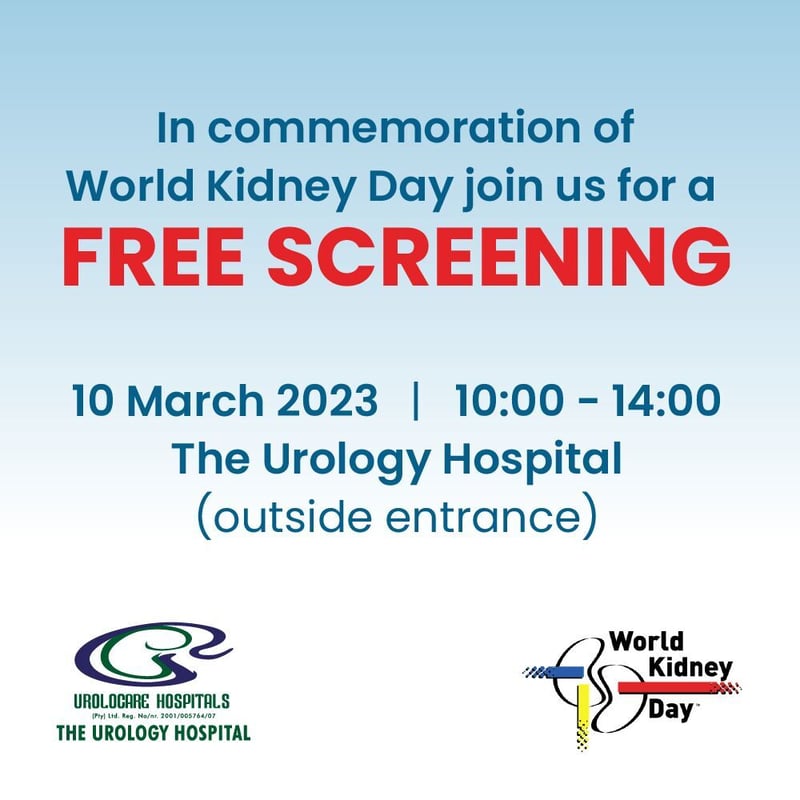An astonishing 5 million South Africans suffer from chronic kidney disease
Written by: WeRise WeRise Save to Instapaper
World Kidney Day: Kidney Health for All – Preparing for the unexpected, supporting the vulnerable!
According to the World Health Organisation (WHO), an estimated 500 million individuals globally suffer from chronic kidney disease and an estimated 5 million South Africans over 20 years of age have chronic kidney disease (CKD).
Even more startling, an updated 2022 study indicates this figure could be considerably higher with 10% of 800 million individuals affected by CKD.
“CKD is a “silent disease” as most patients are asymptomatic at the onset and early stages of the disease. Targeted screening of people at risk of developing CKD is therefore critical for early detection, prevention or slowing down of progression and timely management of CKD”, says Dr Fikile Tsela, Nephrologist at The Urology Hospital Pretoria.
Chronic kidney disease (CKD) is a progressive loss of kidney function over a period of months or years. Each of your kidneys has about a million tiny filters called nephrons. If nephrons are damaged, they stop working. For a while, healthy nephrons can take on the extra work. But if the damage continues, more and more nephrons will shut down. After a certain point, the nephrons that are left cannot filter your blood well enough to keep you healthy. When kidney function falls below a certain level, it’s considered kidney failure and affects your whole body, making you feel very ill. Untreated kidney failure can be life-threatening.
Kidney failure in South African adults is mainly due to inherited Hypertension (60-65%) or Type 2 Diabetes (another 20-25%), with the black population being four times higher than other groups due to the high incidence of Hypertension.
You can lose up to 90% of kidney function before experiencing any symptoms and most people don’t have any symptoms until CKD is at an advanced stage.
Signs of advancing CKD include:
Swollen ankles.Difficulty concentrating.Decreased appetite.Blood in the urine and foamy urine.
Chronic kidney disease does not just disappear and can progress to kidney failure. Blood and urine tests are performed to check for kidney disease, followed by the required treatment. The earlier CKD is detected, the better your chances of receiving effective treatment.
In observance of World Kidney Day, The Urology Hospital will be hosting free screening and exhibitions for the public on the 10th of March 2023 from 10h00 to 14h00.
Address: The Urology Hospital, Pretoria entrance, outside.
Screening criteria:
- Hypertensive
- Diabetic
- Family history of kidney disease
Get new press articles by email
Latest from
- Over Half a Million South Africans Scammed — DSA Warns of Rising Fraud Crisis
- DSA Members offer South Africans a Legit Economic Solution while Fraud & Scams Surge
- Fight South Africa’s Most Common Male Cancer - Know Your Prostate, It’s Worth The Check
- Women’s Month - Urology Hospital Puts Women’s Silent Struggles in the Spotlight
- Youth Unemployment Persists—Entrepreneurship is South Africa’s Urgent Solution
- Urology Hospital Performs Free Procedures for Public Hospital Patients this Mandela Month
- Fighting the ‘Silent Disease’–Urology Hospital’s Free Workshop Tackle’s Chronic Kidney Disease
- Tackling SA’s Unemployment - Key to Economic Growth and Equality – DSA
- Urology Hospital Tackles Myths and Prioritises Women’s Urological Health at Wellness Day
- Urology Hospital Tackles Myths and Prioritises Women's Urological Health at Wellness Day
- Urology Hospital - Doctors collaborate with African Synergy Health to perform free robotic prostatectomies this Mandela Day
- World Kidney Day - Urology Hospital to offer free kidney health screening
- SA matriculants, graduates brace for employment struggle - DSA offers new opportunities
- Indebted South Africans face financial ruin amid interest rate hike and growing risk of scams
- The Urology Hospital partners with African Synergy Health to perform life changing procedures
The Pulse Latest Articles
- Game On, Gloot Girls! Get Ready For The Strongest, Sassiest 10s Series Yet. (February 3, 2026)
- Opinion Piece: Workplace Trends For 2026 And Beyond (February 3, 2026)
- Bite Sized Wellness, Big Time Benefits (January 28, 2026)
- Opinion Piece: The Power Of Engagement Surveys (January 26, 2026)
- Meet Gloot Energy: Power Made For Women (January 22, 2026)
